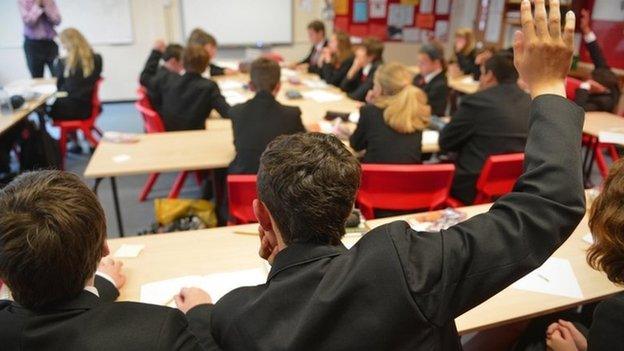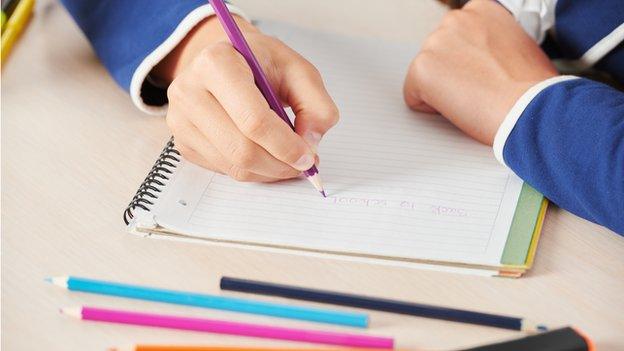Teachers 'must not be scapegoats' says EIS
- Published

The link between poverty and educational attainment is to be debated in the Scottish Parliament
Teachers must not be used as the "scapegoat" for problems in Scotland's education system, the country's largest teaching union has warned.
Studies have shown falls in literacy and numeracy skills, while there are still relatively few university students from poorer backgrounds.
First Minister Nicola Sturgeon admitted on Monday that Scottish education was "not good enough".
But the EIS said this should not lead to more pressure being put on teachers.
The union also stressed that the recent drop in reading and writing skills recorded in the Scottish Survey of Literacy and Numeracy, external (SSLN) was only a "slight dip", mainly among the most impoverished children which it said "underlines the impact of austerity measures on young people".
It comes as MSPs prepare to debate "equity and excellence in education" at Holyrood.
'Parent choice'
Labour has claimed that teachers are under "severe strain" and has called for the new devolved powers which will be coming to Scotland to "ask those who earn the most to pay a little extra to invest in our young people."
The party's education spokesman, Iain Gray said: "It is fair taxes to help the poorest kids. The SNP have opposed this in the past but faced with their own record, and their new found interest, they should think again."
The Conservatives have called for head teachers to be given more autonomy to be "more responsive to parent choice", while the Liberal Democrats want additional government funds to be given to schools to raise attainment among disadvantaged students.
Ahead of the debate, the EIS submitted its views on the Education Scotland Bill, external, highlighting that schools and teachers are committed to tackling the impact of poverty but required the resources to do so.
It also argued that the education system "must not become a convenient political scapegoat for the very difficult societal challenges that poverty in the age of austerity can create".
EIS general secretary Larry Flanagan said: "It is simply wrong and wholly unacceptable for any politician from any political party to attempt to blame schools or teachers for the problems of poverty in society.
"Schools themselves are facing serious challenges owing to falling budgets, scarce resources and cuts in staff numbers.
"The demands placed on teachers are growing, and workload and levels of stress and related illnesses are extremely high.
"Despite all of this, schools are working extremely hard to support pupils from all backgrounds and should be receiving not blame but both praise and more support for this essential role."
'Slight dip'
He added: "The findings of the SSLN also explicitly rule out any notion of declining standards as a full analysis indicates the maintenance of high standards with 80% of pupils measured as doing well or very well.
"Where a slight dip was identified - from before two years ago - this was focused mainly on pupils from the most impoverished backgrounds which is clearly a matter of serious concern but underlines the impact of austerity measures on young people."
Education Secretary Angela Constance will say there "is much to be proud of in Scotland's schools, with children achieving record exam results, fewer young people leaving school with no or few qualifications and record numbers securing positive destinations on leaving school".
Scotland currently sits mid-table in the international rankings for school education, but Ms Constance will say "much more needs to be done to make all of Scottish education truly excellent".
She will add: "While the Scottish government is committed to doing all that it can to eradicate poverty and that poverty can be a barrier to attainment, it should not be used as an excuse for failure."
- Published25 May 2015
